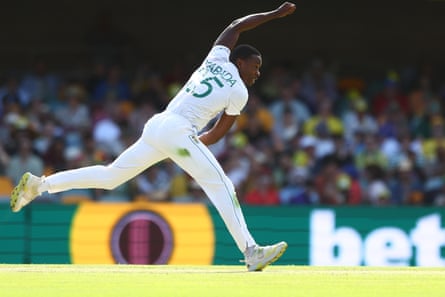Everywhere you look there is decay. Things that once worked no longer do as they should. Rare success stories are inflated beyond their merit. Failures are greeted with accepting shrugs. Short term fixes are in short supply. Twist a narrative enough times and any international sports team will neatly embody the country it represents. That is not necessary when analysing the Proteas and their struggles with the bat. If anything, the comparisons with South Africa are a little too on the nose.
For the daily electrical blackouts see routine batting collapses. For the failed promises of the ruling African National Congress there is the unfulfilled potential of Aiden Markram. Squint your eyes at the crumbling public transport system and you might see Temba Bavuma’s single Test hundred from 89 innings. For the empty space on the team’s shirt where a sponsor should be, well, fill in the blank as you see fit.
Captain Dean Elgar criticised the Gabba pitch that played host to his team’s six-wicket defeat inside two days. This smacked of a shoddy craftsman blaming his tools. After all, it was South Africa, not Australia, who failed to pass 100 in their second innings. It was South Africa’s batters who recorded 14 single digit scores, including six ducks, across 20 individual stays at the crease. Replay this game on any surface you like. The outcome would surely be the same.
The current ineptitude is made worse by three important factors. Firstly, it wasn’t always like this. The Proteas had won all three of their previous visits to Australia and did so with a cluster of batters that would instantly be the most important figure among this crop. In 2008 Jacques Kallis, Graeme Smith, Hashim Amla and AB de Villiers (who all averaged more than 50 for large chunks of their respective careers) were well supported by Neil McKenzie and a young JP Duminy whose 166 at the MCG remains one of the most iconic knocks by a South African.
Amla, Kallis and de Villiers were again in the runs in 2012 and had Faf du Plessis for company. The future skipper scored an unbeaten 110 on debut to save the Adelaide Test en route to a series win. Four years later Quinton de Kock clattered 281 runs across five innings at a strike-rate of 71.5 as South Africa’s bowlers made hay on helpful decks in Perth and Hobart.
One might make the case that it’s never been as good. And that is why these low contributions from the batters are met with dismay.
What must Kagiso Rabada, Anrich Nortje, Marco Jansen and Lungisani Ngidi be thinking every time they’re padding up to face a ball that still has most of its shine? In a way it’s fitting that the Proteas are the most imbalanced outfit in the game. According to the World Bank, South Africa is the most unequal country on the planet where 10% of the population owns more than 80% of the country’s wealth.

All of this, though, would be palatable if there was the promise of a bright new dawn. The first-class system is falling short of its mandate to produce Test-ready batters. A lack of opportunity is partly to blame. In the 2019-20 season batters had at most eight matches to score their runs. Last season, after the reorganisation from six franchises to 15 provinces spread across two divisions, this was reduced to seven.
Those who take guard rarely do so against Test quality bowlers. Rabada and co are either being rested for these four-day games played in front of empty seats or are hurtling down slower ball bouncers on the global T20 franchise circuit. Therefore, runs scored in this purgatory of the cricket world must be accompanied with caveats.
But what other choice do the selectors have when assembling their squad? The well may be dry, but it’s the only one they have. Tony de Zorzi’s 304 not out for Western Province against the Knights last month attracted attention. But he remains on the periphery.
Closer to the epicentre is Ryan Rickelton who was made to look ordinary in his third Test at the Oval in September. The Lions wicketkeeper was ruled out of the Australia tour with an ankle injury but later declared his own fitness, supporting his claim with back-to-back hundreds. Conflicting messages from Cricket South Africa mingled with conspiracy theories on social media. In a country where politicians are seldom forced to answer questions in real time, this was just another communications howler.
The pitch in Melbourne for the Boxing Day Test will almost certainly be kinder to the batters. That will be a relief for the South Africans. But if they fail to pass 200 for the seventh consecutive innings, they’ll have nothing to blame but themselves.


